10 best Microsoft Teams alternatives for productive teams in 2025

Kenneth Pangan
Last edited August 26, 2025

Microsoft Teams does a lot. It bundles chat, meetings, and file storage into one platform, and it’s pretty much essential if your company runs on Office 365. But let’s be real, it’s not the perfect fit for every team. For many, it’s a resource hog that slows down their computer, the interface becomes a maze of channels and files, and its AI features are frustratingly stuck inside the Microsoft bubble.
If any of that sounds familiar, you’ve come to the right place. This guide covers the best Microsoft Teams alternatives for 2025. We’ll look at tools that nail specific jobs, whether you need crystal-clear video calls, a simpler chat app, or an AI that can actually answer questions using knowledge from all your company’s apps.
Why look for Microsoft Teams alternatives?
Having so many features in one app seems like a good idea, but it often creates problems in practice. If you spend any time on forums like Reddit or read reviews on Gartner, you'll notice a few complaints that come up again and again.
- Performance issues: We've all been there. You open Teams, and suddenly your computer’s fan starts screaming. The app can be slow and eat up a ton of memory, which is a real drag on productivity, especially if you’re not working on a brand-new machine.
- Cluttered interface: When you first start using Teams, it can feel like a lot to take in. Once you have a few projects going, the mix of chats, files, and nested replies can get chaotic, making it hard to find what you need.
- The "walled garden" problem: This is a big one. Teams has its own AI, Copilot, which is pretty smart but has a major blind spot: it only knows what’s inside Microsoft 365. It can’t see the vital information your team has stored in Google Docs, Confluence, or your Zendesk help center. This often leads to answers that are incomplete or just flat-out wrong.
- Complicated pricing: Getting all the cool AI features in Teams isn’t simple. You often have to buy a Microsoft 365 plan, then a Teams Premium add-on, and a Copilot license for every single person. It gets expensive and confusing pretty quickly.
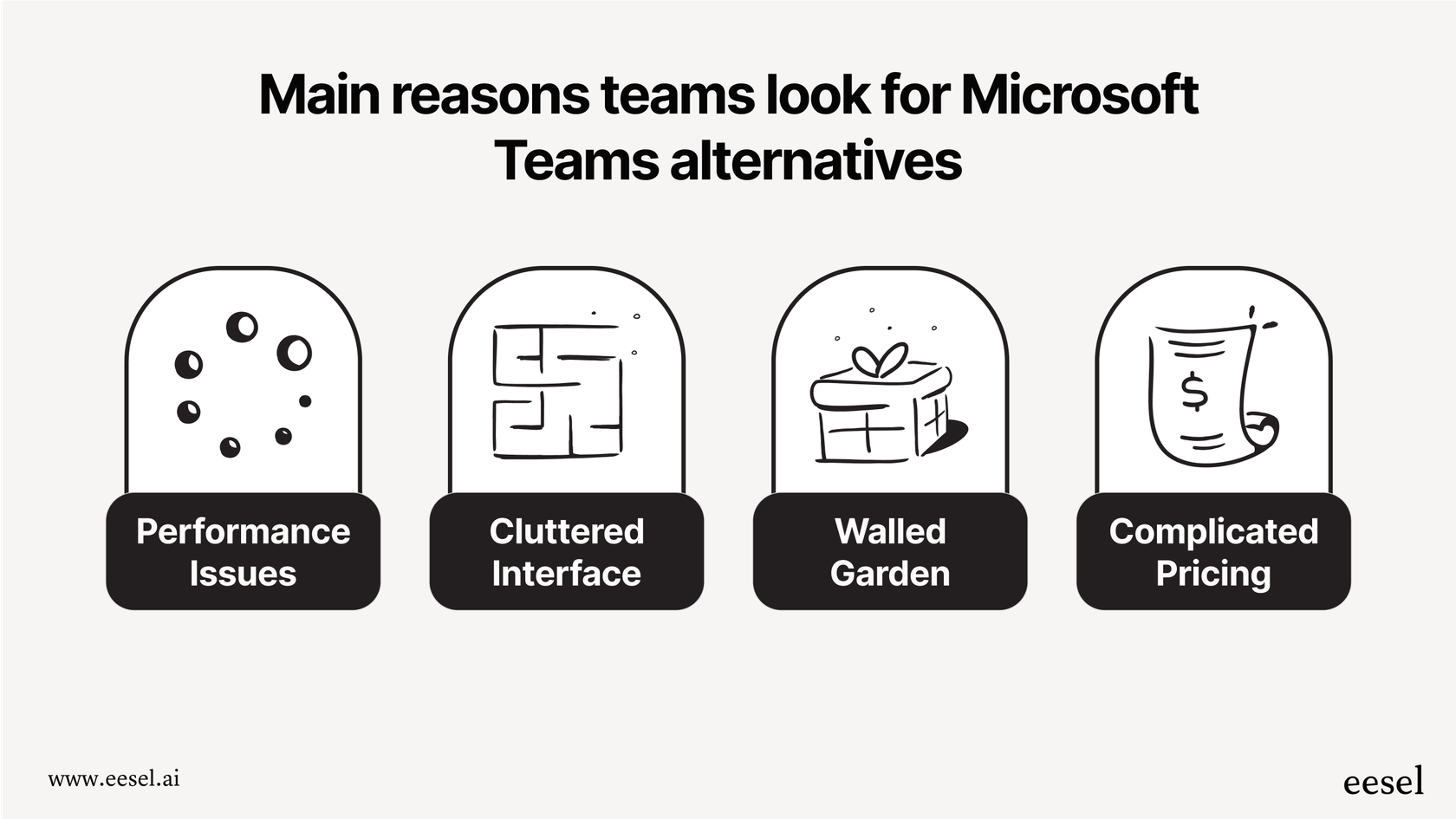
Our criteria for selecting the top Microsoft Teams alternatives
We didn't just pick these tools at random. We measured each one against a few key things to make sure it genuinely offers something better than Teams in at least one important way.
- Core functionality: Does it do its main thing really well? Whether it's video, chat, or project management, the core features have to be solid.
- Ease of use: Is it easy to figure out? Can someone new start using it without needing a week of training videos?
- Integrations: Does it connect with the other tools you use? We looked for platforms that work well with a wide range of apps, not just their own.
- Pricing: Is the cost clear and fair? We gave extra points to tools with straightforward plans and good free options.
- Specialization: Does it solve one problem way better than Teams’ jack-of-all-trades approach?
The best Microsoft Teams alternatives at a glance
If you just want the quick version, here’s a table comparing our top picks.
| Tool | Best For | Standout Feature | Starting Price (per user/month) |
|---|---|---|---|
| Slack | Team chat & usability | Intuitive interface & channels | $7.25 |
| Zoom | Reliable video conferencing | High-quality video at low bandwidth | Free (with limits) |
| Google Workspace | Non-Microsoft ecosystems | Seamless G-Suite integration | $6 |
| Webex | Enterprise-grade security | Advanced security & compliance | Free (with limits) |
| ProofHub | Integrated project management | All-in-one project tools | $45/mo (flat fee) |
| Zoho Cliq | Cost-effective collaboration | Affordable all-in-one feature set | Free (with limits) |
| Mattermost | Self-hosted security | Open-source & data control | Free (self-hosted) |
| RingEX | Unified business communications | Phone, video, and messaging in one | $20 |
| Discord | Free internal communication | Highly customizable servers/channels | Free |
| Chanty | Task management & communication | Built-in task board in chat | Free (with limits) |
The 10 best Microsoft Teams alternatives in 2025
### 1. Slack: A popular Microsoft Teams alternative for team chat and usabilitySlack is the most obvious rival to Teams for chat, and a lot of people still think it’s the best. It’s known for having a clean, simple interface that feels less cluttered than Teams. Conversations flow better, organizing channels is straightforward, and its search feature is surprisingly good at digging up that one message you sent three months ago. On top of that, its huge library of integrations often feels smoother than what Teams offers.
Pros:
- A great user experience that’s easy for anyone to pick up.
- Fantastic for creating a friendly, chat-focused company culture.
- The search function is top-notch for finding old conversations and files.
Cons:
- Video calls aren't as good as in Teams, and the free plan only allows for one-on-one calls.
- The per-user cost can add up fast as your team grows.
Pricing:
- Free Plan: Available, but you can only see the last 90 days of messages.
- Pro Plan: Starts at $7.25 per user, per month (billed annually).
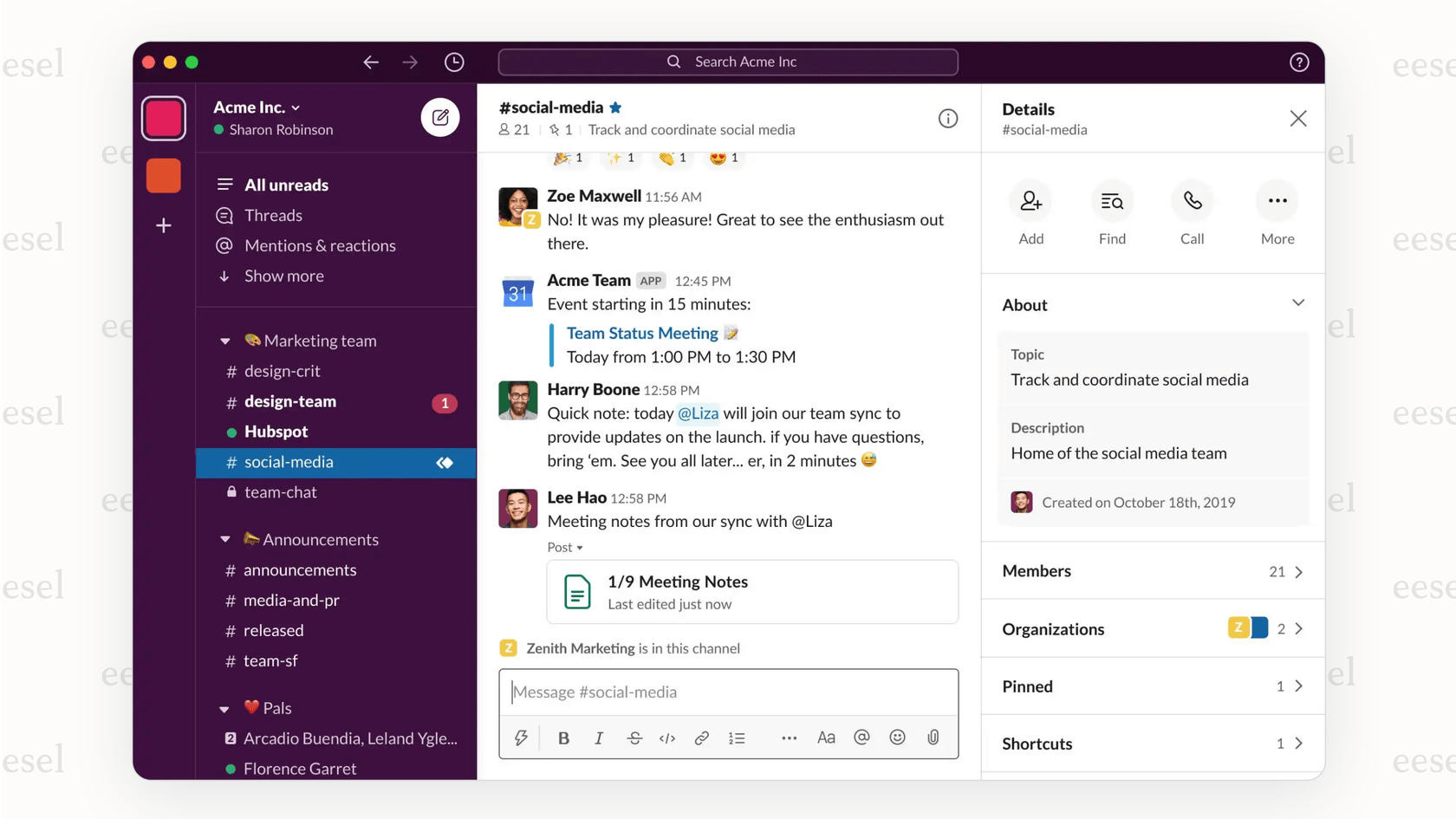
2. Zoom: One of the top Microsoft Teams alternatives for reliable video conferencing
If you’ve ever been annoyed by a laggy or dropped Teams call, Zoom is the answer. The company became a household name for one reason: it delivers high-quality, stable video that just works, even if your internet isn't perfect. The interface is incredibly simple, making it easy for both your team and outside guests to join and manage meetings. While Teams has gotten better at video, Zoom is still the standard for reliability and ease of use.
Pros:
- Best-in-class video and audio quality that you can count on.
- Super simple and intuitive for everyone involved in a meeting.
- Features like breakout rooms and polls are well-designed and easy to use.
Cons:
- The chat and file-sharing tools feel pretty basic compared to Teams or Slack.
- The 40-minute limit on group meetings on the free plan can be annoying.
Pricing:
- Basic Plan: Free, with a 40-minute limit on meetings with 3+ people.
- Pro Plan: Starts at $13.33 per user, per month (billed annually).

3. Google Workspace: A key Microsoft Teams alternative for non-Microsoft ecosystems
If your company runs on Google’s tools, then Google Workspace is the natural choice. The combination of Google Meet, Chat, and Drive provides a connected experience that’s on par with the Microsoft ecosystem. The way Meet, Calendar, Google Drive, and Google Docs work together is seamless, creating a smooth workflow. It’s also web-based, which usually makes it faster and less of a drain on your computer than the Teams desktop app.
Pros:
- Deeply integrated with all the other Google apps you already use.
- Google Meet's free version is generous and works really well for video calls.
- It's generally faster and uses fewer system resources.
Cons:
- Google Chat still doesn't have as many features as Teams or Slack.
- It feels more like a collection of separate apps rather than one single program.
Pricing:
- Business Starter: Starts at $6 per user, per month.
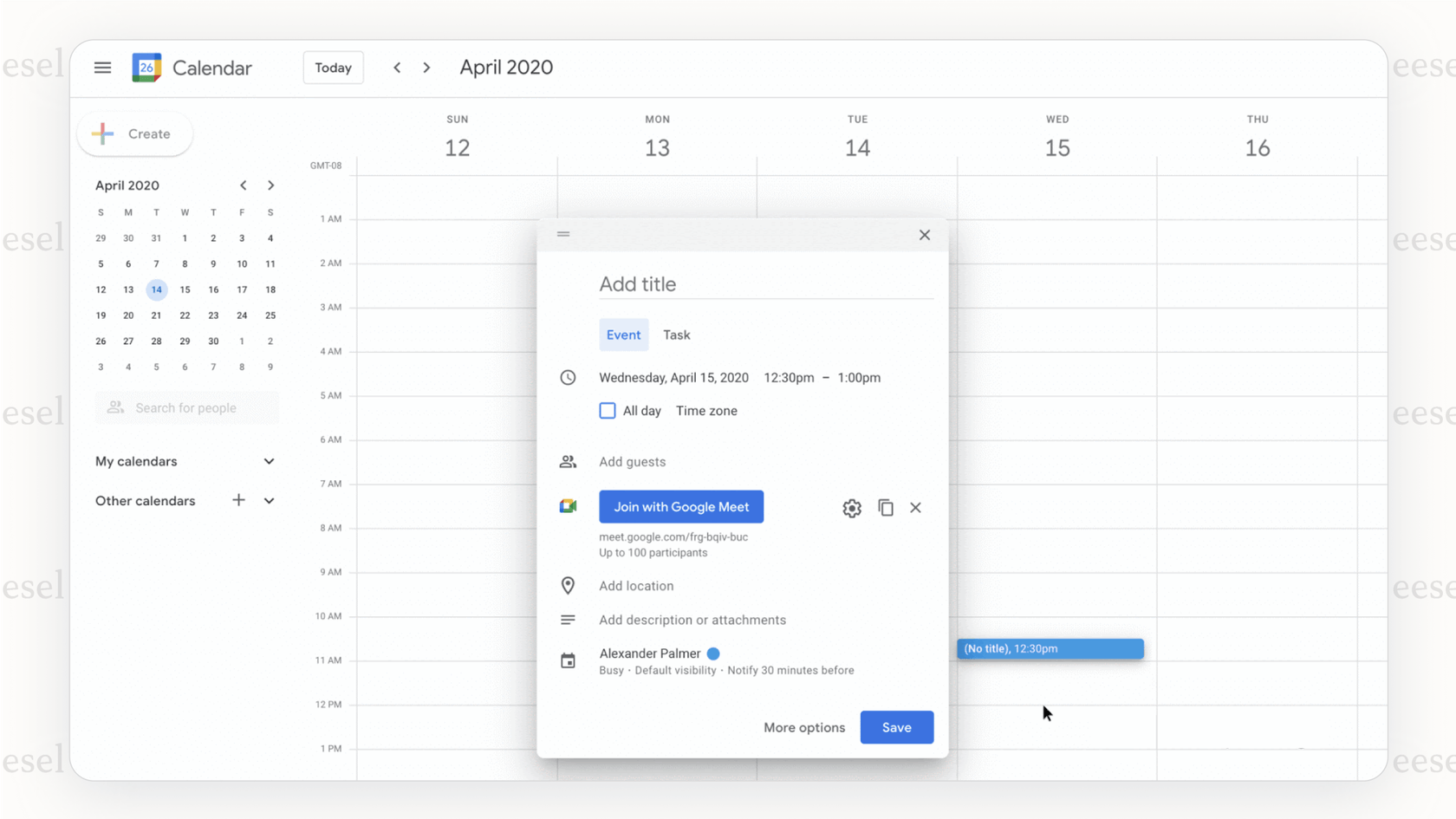
4. Webex: A secure Microsoft Teams alternative for enterprise-grade security
For big companies where security and following regulations are top priorities, Webex by Cisco is a leading option. It’s a full collaboration platform that puts a major focus on security, with features like end-to-end encryption and a long list of compliance certifications. While Teams is secure, Webex often provides the extra layer of control that large organizations and regulated industries need.
Pros:
- Offers a high level of security, privacy, and compliance features.
- Includes useful AI tools like real-time translation for over 100 languages.
- A dependable all-around tool for meetings, messaging, and calls.
Cons:
- The interface can feel a bit corporate and has a steeper learning curve.
- It can get pricey if you need all the premium features, making it a tough sell for smaller teams.
Pricing:
- Free Plan: Available for basic meetings up to 40 minutes.
- Meet Plan: Starts at $12 per user, per month (billed annually).

5. ProofHub: A project management-focused Microsoft Teams alternative
If you're mainly using Teams to manage projects, you might feel like its tools are a bit disorganized. ProofHub is a dedicated project management and collaboration tool that feels much more organized. It puts tasks, Gantt charts, discussions, calendars, and documents all in one place. Unlike Teams, where you have to add apps like Planner, ProofHub has these project tools built right in, which makes life easier for project-focused teams.
Pros:
- A complete platform with strong project management features.
- The simple, flat-fee pricing is a great deal for larger teams.
- Lets you track projects in different ways with Table, Board, and Gantt chart views.
Cons:
- It doesn't have its own video conferencing, so you have to use an integration for calls.
- There's no free plan, but you can try it out for free.
Pricing:
- Essential Plan: Starts at $45 per month (billed annually) for unlimited users.
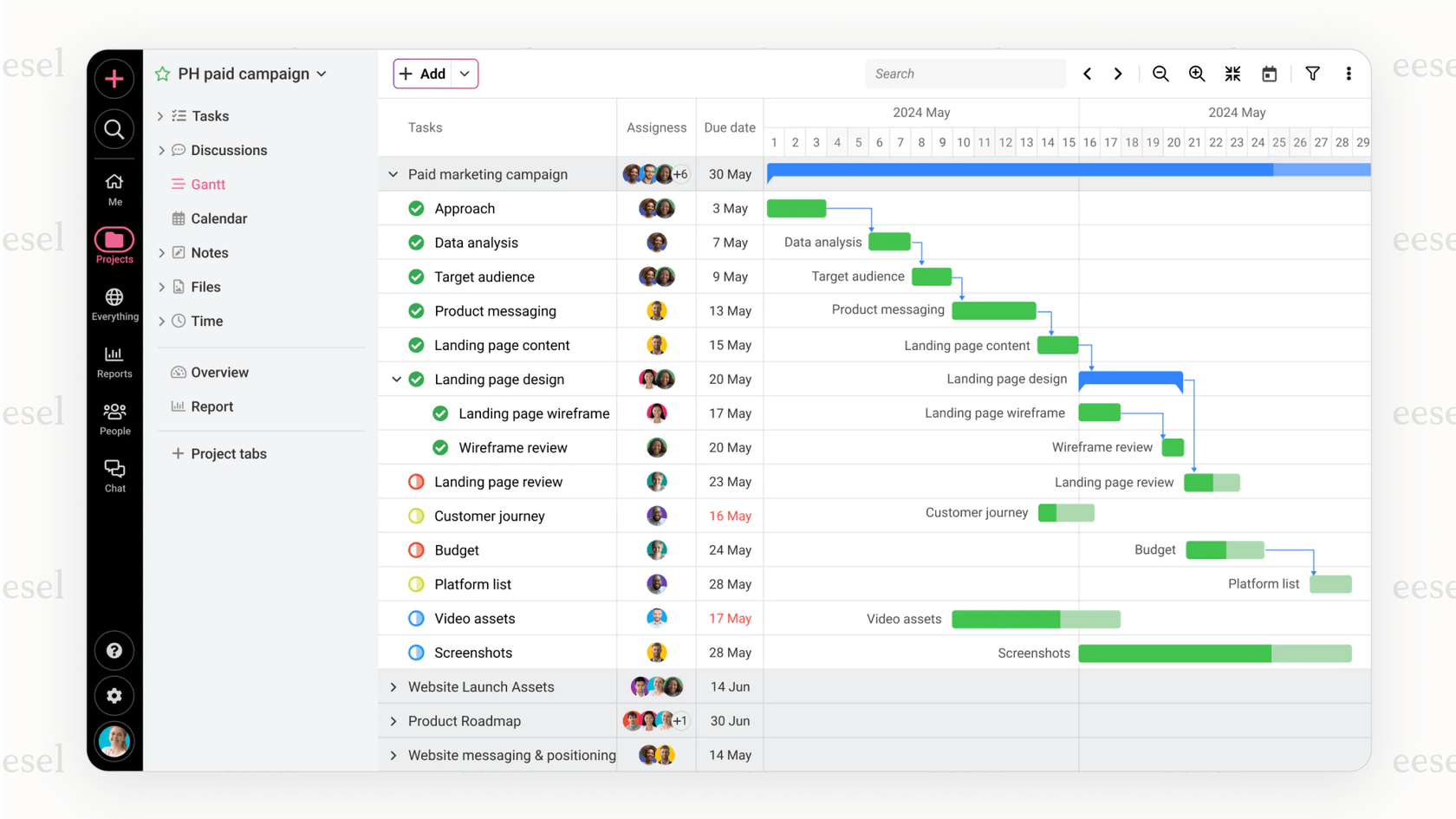
6. Zoho Cliq: A cost-effective choice among Microsoft Teams alternatives
For teams looking for an affordable alternative that’s still packed with features, Zoho Cliq is a strong choice. It offers a full set of communication tools,chat, audio/video calls, and task management,for a lot less money than its competitors. It’s part of the bigger Zoho family of apps but works perfectly well on its own, offering a lightweight experience that’s easier on your computer than Teams.
Pros:
- Very affordable, with a great free plan and cheap paid options.
- Doesn't require a lot of bandwidth to run smoothly.
- Has some neat features like on-demand chat summaries and the ability to fork conversations.
Cons:
- The features might not be as polished or deep as what you’d get from a more specialized tool.
- The interface is functional, but it doesn't look as modern as some others.
Pricing:
- Free Plan: Available for up to 100 users, with some limits.
- Unlimited Plan: Starts at just $1 per user, per month (billed annually).
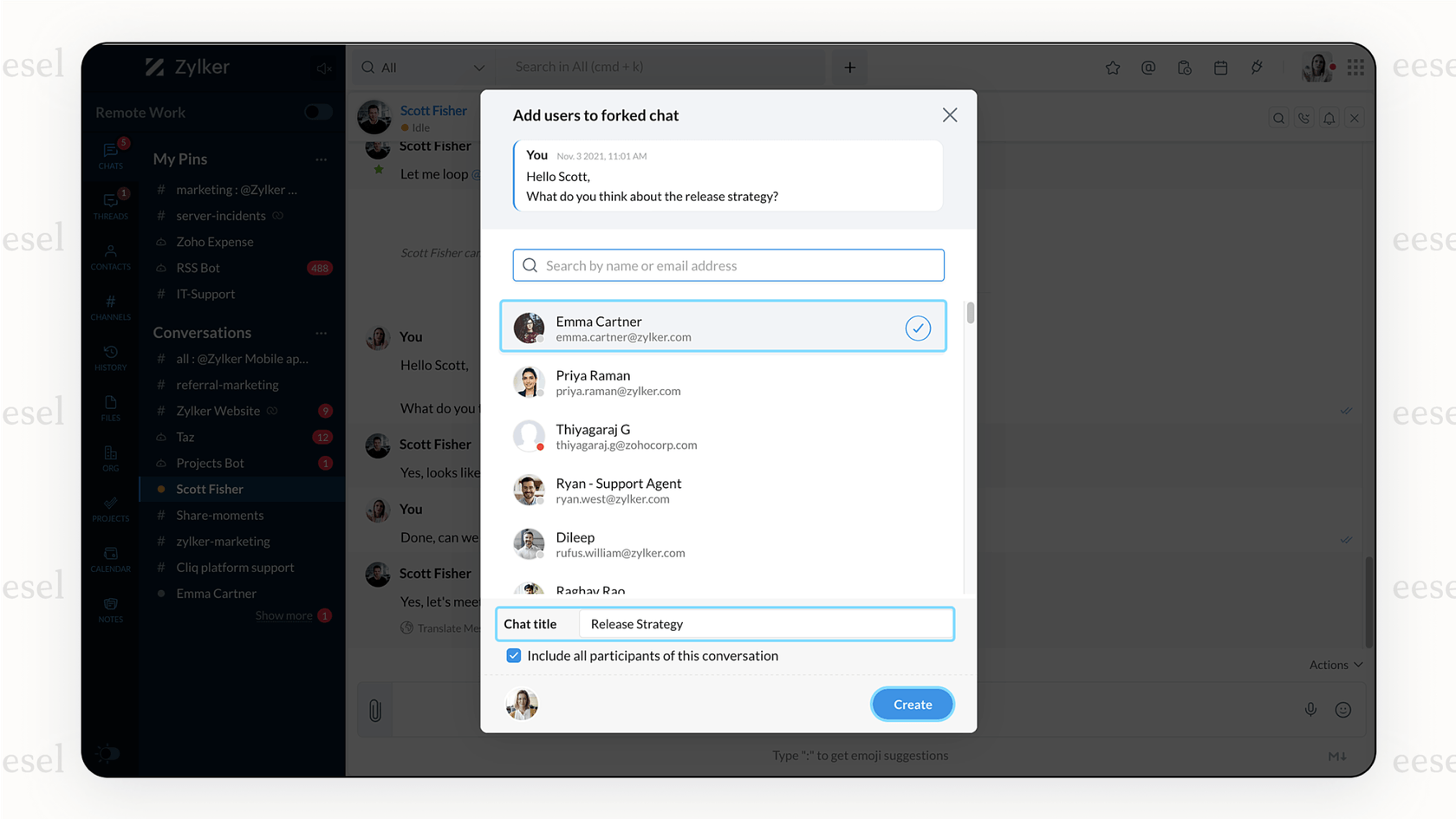
7. Mattermost: A self-hosted Microsoft Teams alternative for security
For organizations that need maximum security,think government, defense, or finance,Mattermost offers complete control. It's an open-source platform that you host yourself, either on your own servers or in a private cloud. This means you own and control all your data, providing a level of security and privacy that public cloud services can't offer.
Pros:
- You get full control over your data and privacy by hosting it yourself.
- It's highly customizable and has developer-friendly tools.
- Gives you detailed admin controls for security and compliance.
Cons:
- You need some technical know-how to set it up and keep it running.
- It doesn't have built-in video calls; you'll need to integrate another tool for that.
Pricing:
- Free Plan: Available if you host it yourself.
- Professional Plan: Starts at $10 per user, per month for more advanced features.
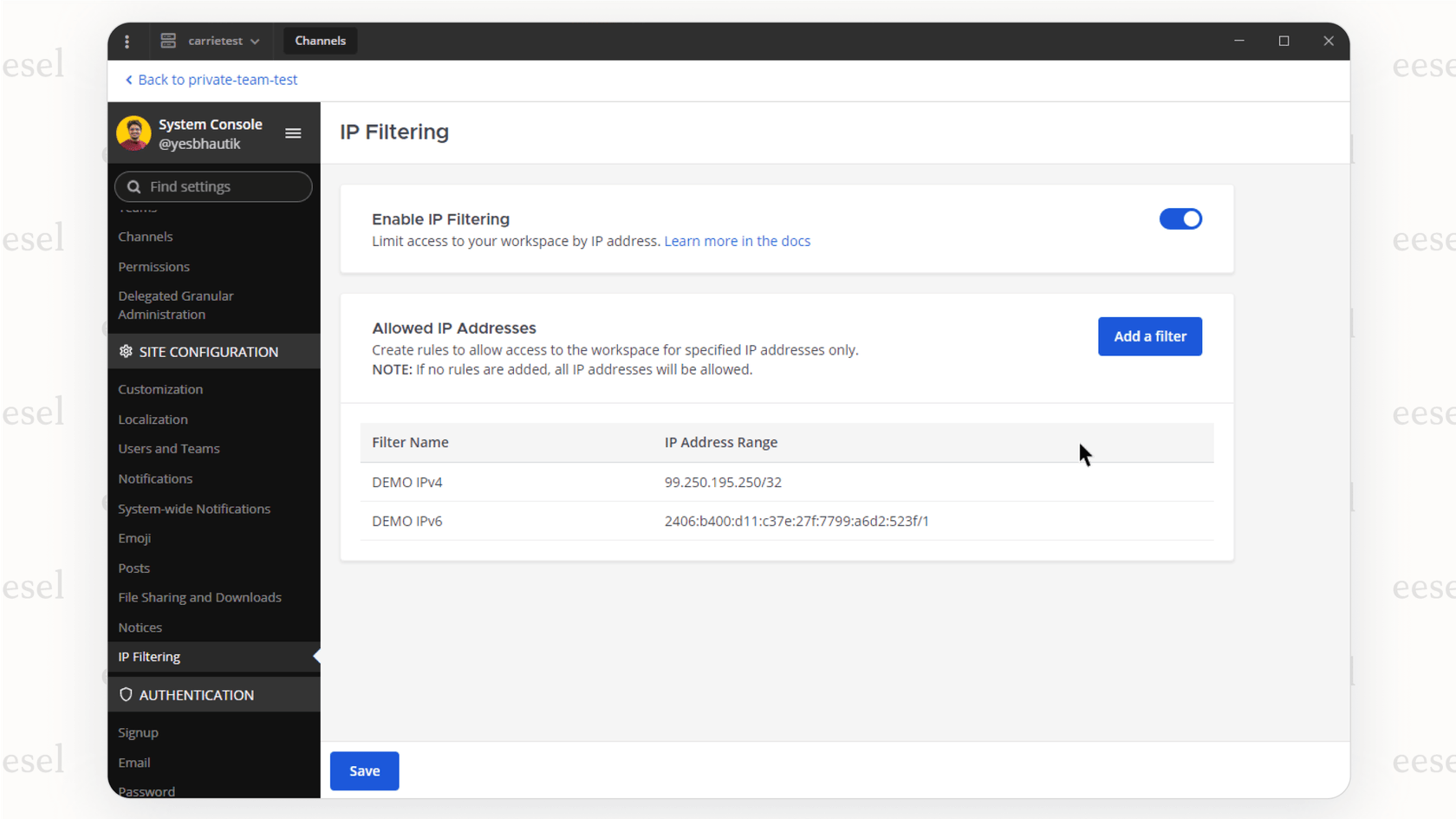
8. RingEX: A unified communications platform among Microsoft Teams alternatives
If your communication needs go beyond just talking to your team and include calling customers, RingEX (formerly RingCentral) is a great all-in-one option. It bundles video meetings and team messaging with a complete cloud phone system (VoIP). This lets you manage internal chats, team meetings, and your business phone lines from a single app, making it one of the most complete Teams alternatives out there.
Pros:
- Puts messaging, video, and a business phone system in one place.
- Extremely reliable, with a 99.999% uptime guarantee.
- Has strong international calling features for over 100 countries.
Cons:
- It might be too much for small teams that don't need a full phone system.
- The price is higher than many other tools, but it also does more.
Pricing:
- Core Plan: Starts at $20 per user, per month (billed annually).
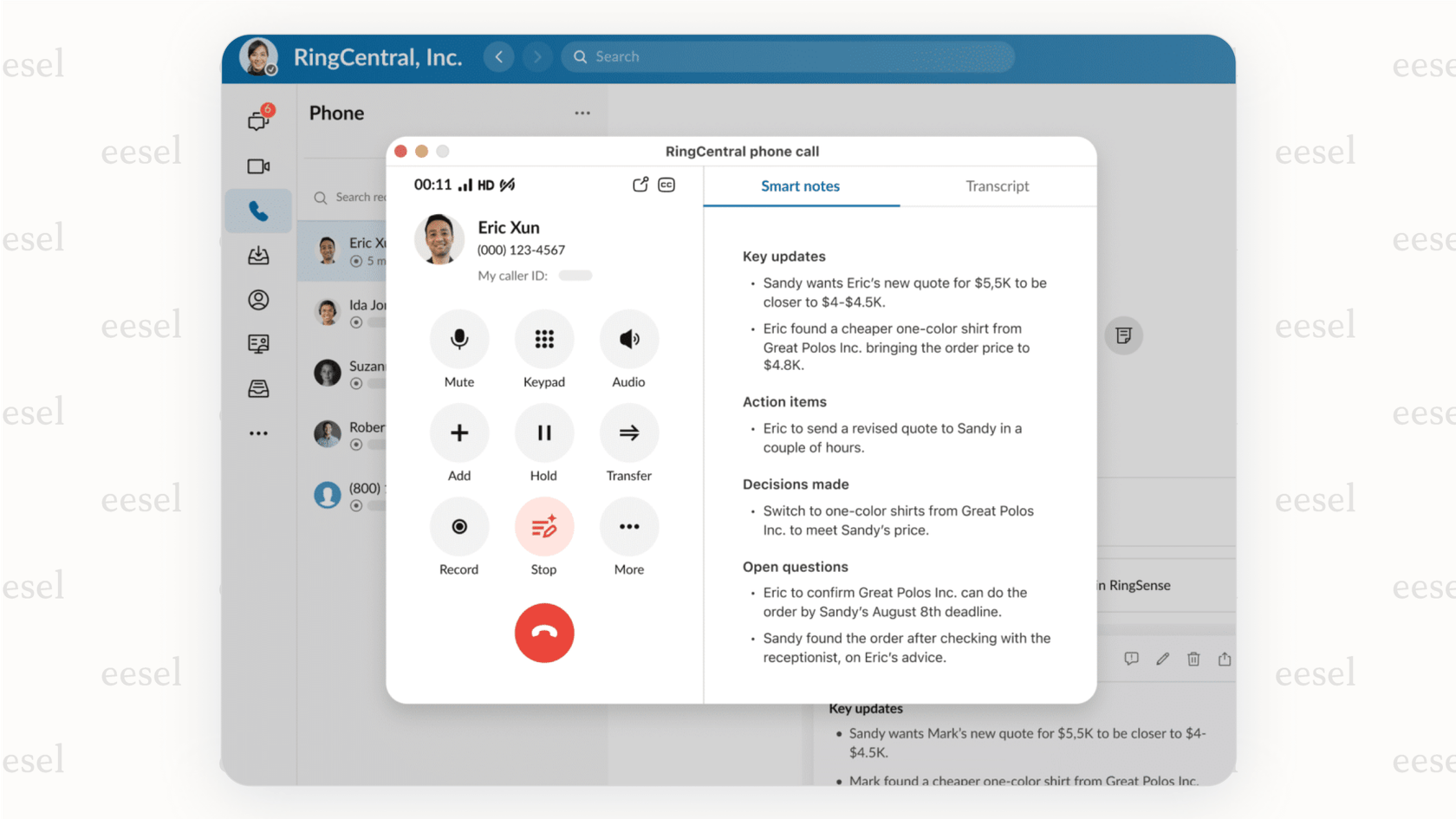
9. Discord: A free Microsoft Teams alternative for internal communication
Discord started as a tool for gamers but has become a surprisingly good communication platform for all sorts of teams. It’s great at creating custom community spaces with separate text and voice channels. The voice channels are especially useful for casual, always-on chats that feel a bit like being in an office together. For teams that want a free, fun, and easy-to-use platform for internal chat, Discord is a solid choice.
Pros:
- The free plan is powerful and has very few restrictions.
- It’s intuitive, easy to use, and has excellent voice chat quality.
- You can customize almost everything with roles, permissions, and bots.
Cons:
- It doesn't have the enterprise-level security and compliance features many businesses need.
- It doesn't integrate well with a lot of typical work apps.
Pricing:
- Free Plan: Almost every core feature is free.
- Nitro: Starts at $2.99 per month for extras like better streaming quality and custom emojis.
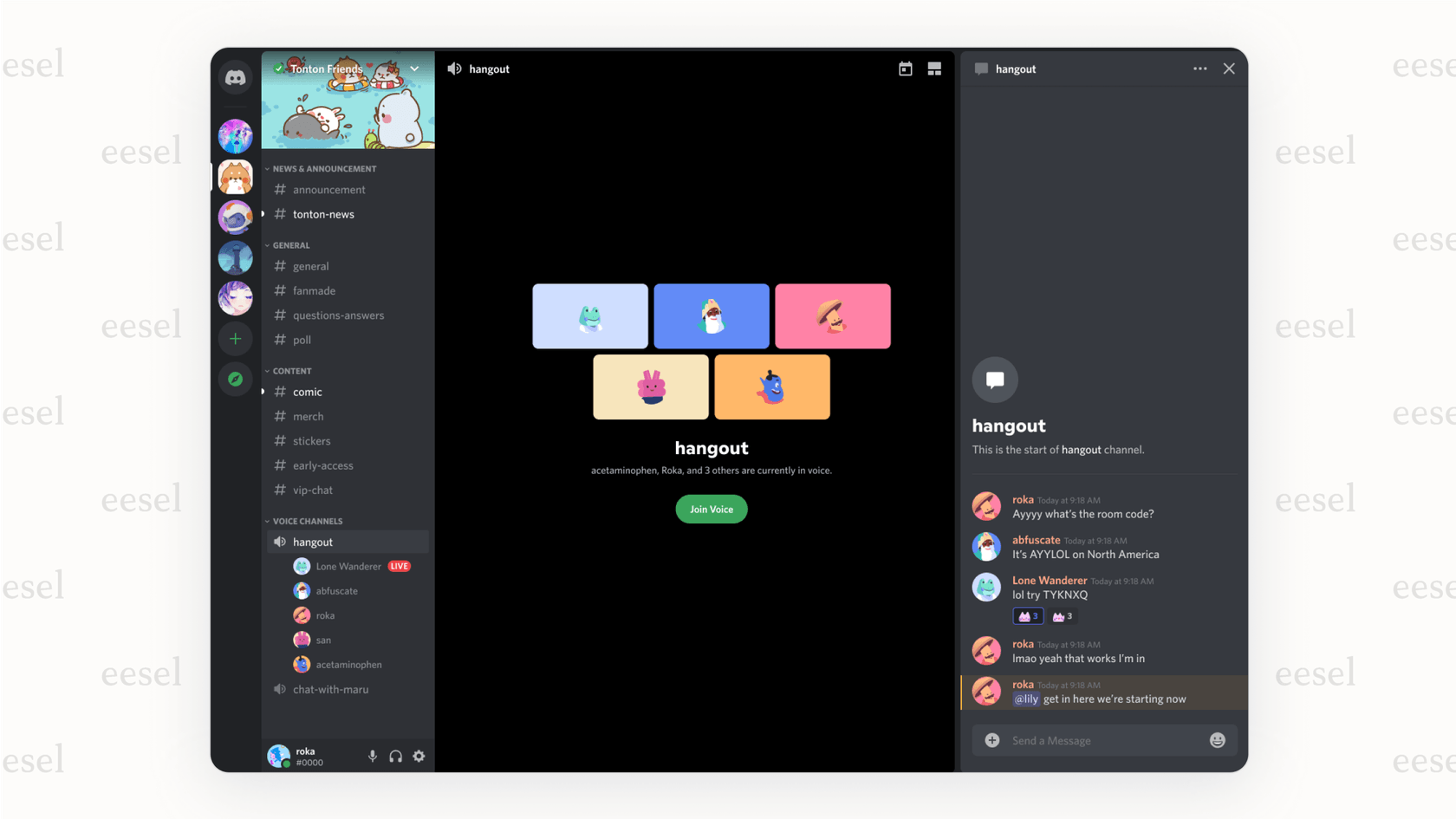
10. Chanty: A Microsoft Teams alternative for task management & communication
Chanty finds a nice middle ground between team chat and task management. It's a great choice for teams that want to turn their conversations into action items without switching apps. It includes a simple Kanban board where you can create and manage tasks right from your chat threads. This helps make sure good ideas don't get lost in the conversation.
Pros:
- Combines chat, video, and task management in one simple interface.
- The ability to turn any message into a task is a huge productivity booster.
- The pricing is affordable and easy to understand.
Cons:
- Its reporting features aren't as powerful as dedicated project management tools.
- The video conferencing is more basic than what you'd find in Zoom or Teams.
Pricing:
- Free Plan: Available for teams of up to five people.
- Business Plan: Starts at $3 per user, per month (billed annually).
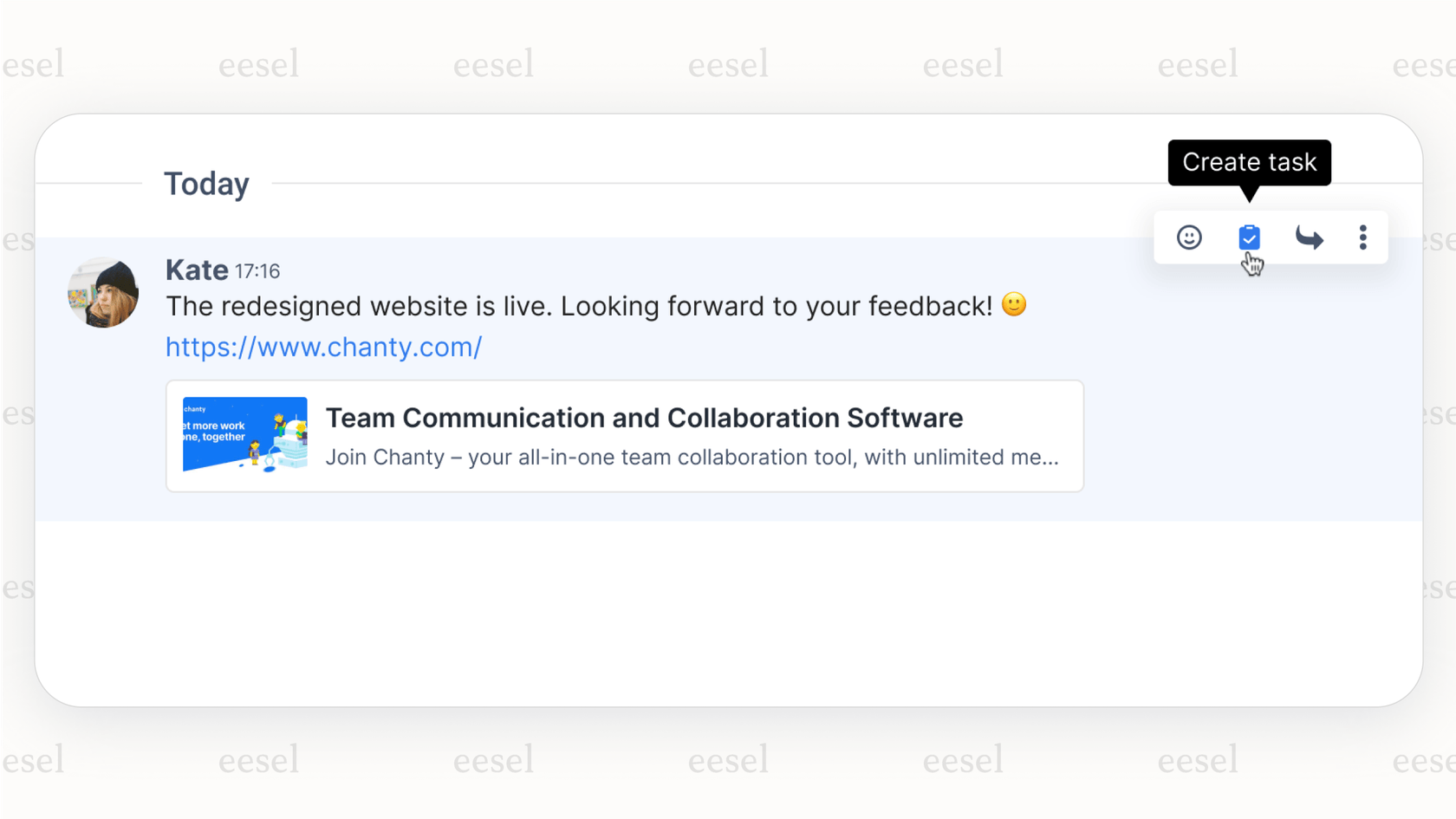
How to choose the right Microsoft Teams alternatives for your team
The "best" tool is simply the one that fixes your team's biggest headaches. Here’s a simple way to decide.
- Figure out your main problem: What annoys you most about Teams? Is it the laggy video calls? The messy chat? Or the fact that its AI can’t find information stored in Confluence? Your biggest frustration should point you in the right direction. For example, if your IT help desk is swamped with the same questions over and over, an automation tool like eesel AI will help a lot more than just another chat app.
- Look at your other tools: If your team is already using Google Workspace, a tool like Google Meet just makes sense. If security is your number one concern, a self-hosted option like Mattermost is the obvious choice. Think about how a new tool will connect to your help desk, wiki, and other apps you rely on.
- Compare the prices: Don't just look at the per-user cost. Think about the value of flat-fee pricing (ProofHub), interaction-based pricing (eesel AI), and what the total cost will be after you add up all the necessary licenses and add-ons.
- Try it out: Don’t commit to a tool without testing it first. Have a small group use it for a week and get their honest feedback on how it works in the real world and if it actually improves their daily workflow.
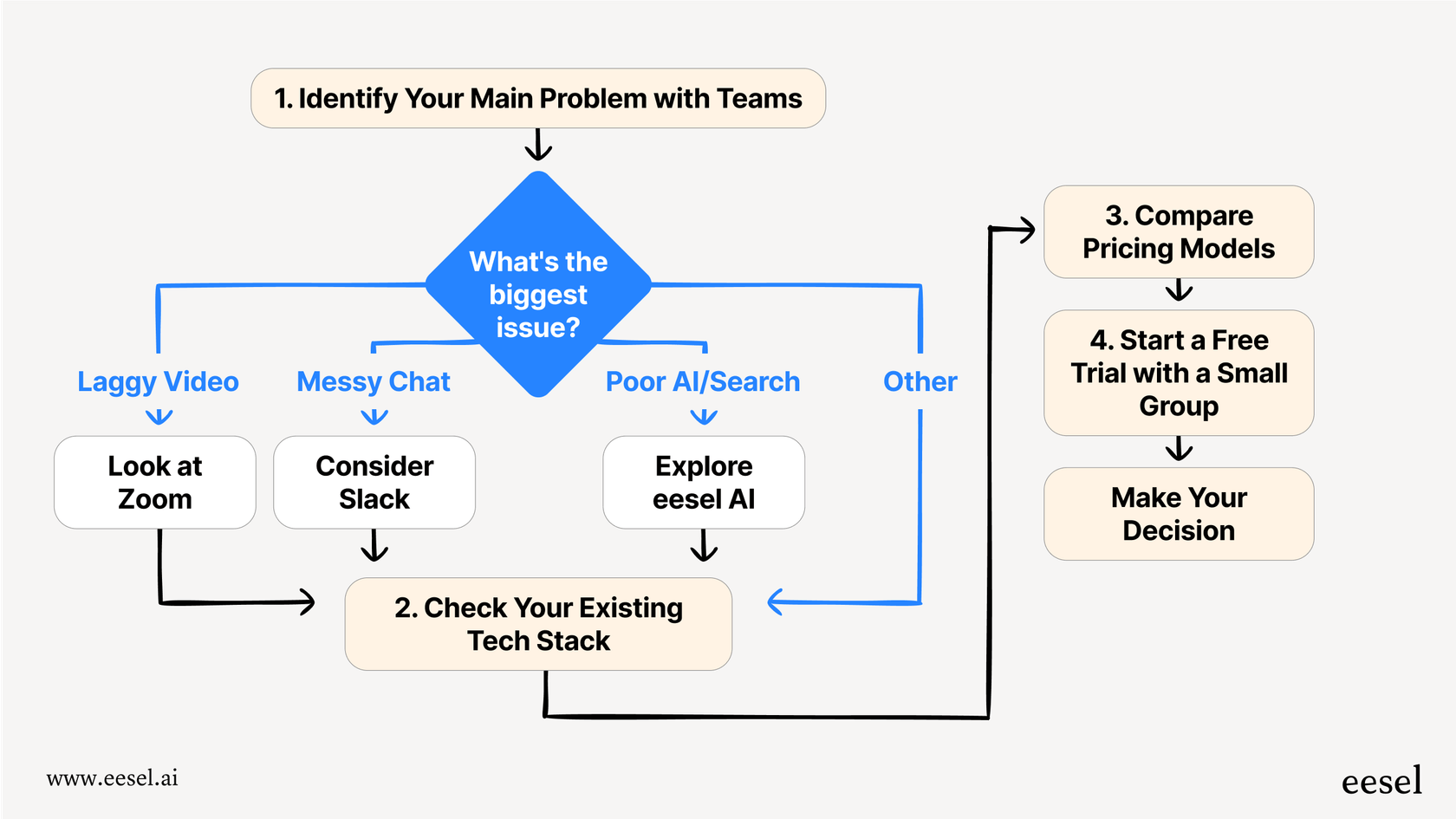
Build a smarter stack with Microsoft Teams alternatives
You don't necessarily have to ditch Teams completely. Often, the best approach is to enhance it with specialized tools that do one thing really, really well. For most companies today, the problem isn't where people are talking, but where their knowledge is scattered. Teams is good for keeping conversations in one place, but it can't connect the dots between all the other essential apps your company uses.
This is where a tool like eesel AI can make a huge difference. It bridges that gap, creating a single source of truth so your team can get fast, reliable answers from all your company's knowledge, right from the Microsoft Teams interface. It turns Teams from just a chat app into the brain of your entire company.
Ready to stop the endless searching and give your team the answers they need, right where they work? Book a demo of eesel AI or start your free trial today.
Frequently asked questions
Many alternatives are less resource-intensive. Google Workspace is web-based and generally faster, while specialized tools like Zoom for video and Zoho Cliq for chat are designed to be lightweight and run smoothly.
Zoho Cliq is extremely affordable, and ProofHub's flat-fee pricing offers great value for growing teams. For free options, Discord and Chanty provide robust communication and task management features for small teams.
For the highest level of security, a self-hosted platform like Mattermost gives you complete ownership of your data. For a managed service with top-tier, enterprise-grade security features and compliance, Webex is a leading option.
Yes, and this is often the best strategy. You can integrate a specialized tool like eesel AI directly with Teams to fix its poor cross-app search, giving you accurate answers from all your company knowledge without a disruptive switch.
Google Workspace itself is the most natural choice, as its suite of tools (Meet, Chat, Drive) is designed for perfect integration. This provides a much smoother workflow than trying to connect Teams to a Google-centric environment.
Share this post

Article by
Kenneth Pangan
Writer and marketer for over ten years, Kenneth Pangan splits his time between history, politics, and art with plenty of interruptions from his dogs demanding attention.





